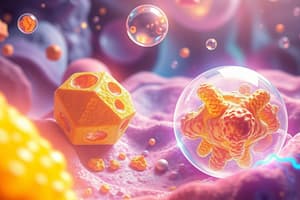Podcast
Questions and Answers
What is the primary role of carbohydrates in the human body?
What is the primary role of carbohydrates in the human body?
- Protein synthesis
- Energy production (correct)
- Storage of fat
- Enzyme production
Red blood cells can utilize fatty acids for energy production.
Red blood cells can utilize fatty acids for energy production.
False (B)
What is the first stage of glucose breakdown called?
What is the first stage of glucose breakdown called?
glycolysis
Excess glucose is stored in the body as __________.
Excess glucose is stored in the body as __________.
Which organelle is primarily involved in the second stage of glucose breakdown?
Which organelle is primarily involved in the second stage of glucose breakdown?
The process of cellular respiration includes an uncontrolled burning of glucose.
The process of cellular respiration includes an uncontrolled burning of glucose.
Name one function of carbohydrates besides energy production.
Name one function of carbohydrates besides energy production.
Match the functions of carbohydrates with their descriptions:
Match the functions of carbohydrates with their descriptions:
What is the primary effect of prolonged muscle use on glycogen reserves?
What is the primary effect of prolonged muscle use on glycogen reserves?
The liver stores the same amount of glycogen as muscle tissue.
The liver stores the same amount of glycogen as muscle tissue.
What type of energy source do muscles rely on after glycogen stores are depleted?
What type of energy source do muscles rely on after glycogen stores are depleted?
Excess glucose can be converted into _____ if the body's energy, glycogen-storing, and building needs are met.
Excess glucose can be converted into _____ if the body's energy, glycogen-storing, and building needs are met.
Match the following terms with their descriptions:
Match the following terms with their descriptions:
Which of these statements about the liver's role in glucose metabolism is true?
Which of these statements about the liver's role in glucose metabolism is true?
A diet high in carbohydrates and calories can contribute to fat storage.
A diet high in carbohydrates and calories can contribute to fat storage.
Flashcards are hidden until you start studying
Study Notes
Carbohydrate Functions
- Carbohydrates are essential for energy production, storage, building macromolecules, sparing protein, and assisting in lipid metabolism.
- The primary role of carbohydrates is to supply energy to all cells in the body.
- Red blood cells rely solely on glucose for energy production.
- The brain primarily uses glucose for energy, but can utilize other sources under extreme starvation conditions.
- The liver redistributes approximately 70% of glucose from digestion back into the bloodstream.
Energy Storage
- Excess glucose is stored as glycogen, primarily in muscles and liver.
- Glycogen can hold over 50,000 glucose units and is highly branched, allowing for rapid glucose release when needed.
- The human body stores enough glycogen for approximately 4,000 kilocalories of energy.
- Prolonged muscle use can deplete glycogen reserves, leading to fatigue and decreased exercise performance.
- Athletes can increase their glycogen reserve by increasing carbohydrate intake and reducing training intensity for 3-5 days before an event.
- The liver stores glycogen and releases it into the bloodstream to maintain blood glucose levels between meals.
Building Macromolecules
- Glucose is converted to ribose and deoxyribose, building blocks for RNA, DNA, and ATP.
- Glucose is used to create NADPH, crucial for oxidative stress protection and various chemical reactions.
- Excess glucose can be converted to fat when energy, glycogen storage, and building needs are met.
Sparing Protein
- When glucose supplies are insufficient, the body synthesizes glucose from amino acids, primarily from muscle tissue.
- Adequate glucose levels spare protein breakdown for glucose production.
Lipid Metabolism
- Increased blood glucose levels inhibit the use of lipids as an energy source.
- Insulin, released in response to rising blood glucose levels, promotes use of glucose over lipids for energy production.
- Adequate glucose levels prevent ketosis, a metabolic condition where ketone bodies build up in the blood.
- Ketosis can occur due to fasting, malnutrition, or conditions like Type 1 diabetes.
- A minimum of 50 grams of carbohydrates per day is recommended to prevent ketosis in adults.
Studying That Suits You
Use AI to generate personalized quizzes and flashcards to suit your learning preferences.




